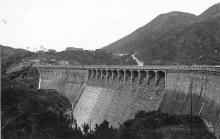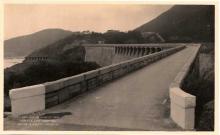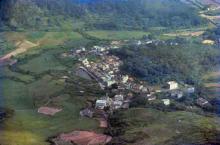"Cash's Bungalow" [????-????]
Primary tabs
Submitted by David on Mon, 2015-03-16 17:22
Current condition:
Demolished / No longer exists
[6 Apr 2017 - updated location of marker based on GW's comment below.]
Position is based on Philip's notes and map at: http://battleforhongkong.blogspot.hk/2015/03/erinville-and-cashs-bungalo...




Comments
Cash's Bungalow
At www.battleforhongkong.blogspot.hk/2015/03/erinville-and-cashs-bungalow-a... , Phil has posted a very interesting article about a recent visit to the site of Cash's Bungalow in which he nails down its location as the top of the mound to the north-east of the Tai Tam Crossroads. The present location of the "place" marker should therefore be moved.
The following photo, posted by Annilisec, is already on Gwulo and shows Cash's Bungalow in the distance;
It shows at least two buildings at the site, in the middle of the photo silhoetted against the sky. It's too vague to make out much detail.
There's another distant pic of the bungalow here;
http://www.croiseur-lamotte-picquet.fr/index.php?page=hong (scroll down to "les environs de Hong Kong". It's on the right of the fourth row).
If I understand correctly it was taken by a French sailor in 1938 or 9. If you zoom in, the main building seems to have a long flat roof flanked by two distinct gables at each end.
Just a few years later, in 1946-7, Hedda Morrison took a photo from exactly the same place as the French photographer. As is often the case with Hedda's pics, accessing them is troublesome - but they're such high quality that it's always worth the effort. Go to the Harvard Uni site at:
http://via.lib.harvard.edu/via/deliver/advancedsearch?_collection=via
then type "tai tam" in the top line of the search boxes, which gives you about 6 or 7 pics to choose from, of which the second one is the one you're after. Zooming in on the Bungalow shows it's now a roofless shell. But the profile of the building has changed too. Although roofless, now the side facing the camera contains three small triangular gables, plus the two larger ones at each end.
Either Cash's Bungalow was renovated or remodeled after the Frenchman's photo in 1938-9 and then damaged during the 1941 war, or it was being extensively renovated in 1946-7 when Hedda took her photo.
Sorry for all the links that make this difficult to follow.
Cash's Bungalow
Thanks for the extra info &
Thanks for the extra info & photos. I've moved the marker to the correct location.
Does this house belong to
Does this house belong to Johnny Cash, the famous 50's singer?
The Mr Cash who owned this
The Mr Cash who owned this bungalow was Albert Iveson Cash. You can read about him at http://battleforhongkong.blogspot.com/2015/03/erinville-and-cashs-bungal...
Cash's Bungalow - Tai Tam (2021)
Previous Cash's Bungalow site revisited and explored at a quick glance.
The small path/drive towards bungalow was still there and overgrown a bit from both side. I am not sure a small car can go through nowadays. There is a collapsed brick structure with small pebble stones and concrete over the top at the end of the path over the right side. It looks a pillar or a standing structure. There is a square feature appeared in Geoinfo Map and this is likely the corresponding on-site structure.
There is another brick built structure that remains in good shape on the southeast of the site. In the middle of the site, a dip was noticed on the ground with lots of nearby overgrowth. A torch is needed if for a closer look. Not sure what's inside or underneath.
Amazing expedition in 30mins!
Cash's Bungalow
This was what the inside of the "dip" looked like when I visited in 2017.
From what I can remember it's a trench, straight, about 7 meters long, shallow and narrow, barely wide enough for an adult to crawl along, topped by corregated iron sheets and covered in earth, with a similar entry/exit hole at the other end. From Herman's photo it seems that the earth has been cleared away from a part of the left side since I was there. I have not come across any similar structures and don't know what its function was.
Phillip Cracknell's excellent blog linked in the post above suggests the small brick building may have been an incinerator. It has a concrete trough on the floor which I guess was used to collect something.
I've seen bigger incinerators of different designs, but considering its location in the garden of an isolated home this could well have been an incinerator for burning garden waste and the relatively small amounts of domestic waste generated by one household. If so, perhaps the trough collected the ash. The only alternative function I can think of is a "dry" toilet - at least it faces away from where the bungalow was, which would have preserved modesty!
Another interesting feature at the site is this "double trench" situated on the side of the drive roughly opposite the remains of the brick pillar.
Apologies for the quality of the photo. Basically it's two adjacent, square holes in the ground. I believe they were dug by the British military before or during WW2 to cover the strategically important Tai Tam Crossroads which they overlook. However, this was not the position of the Japanese machine gun so expertly tracked down by Phil Cracknell and described in his blog. Puzzled, I asked Phil why the Japanese had not made use of the trench. He correctly pointed out that the position they chose is slightly higher than the double trench, and that this height advantage may have been significant when engaging their enemy in the water catchment on the opposite hillside at approximately the same altitude. I think he's right.